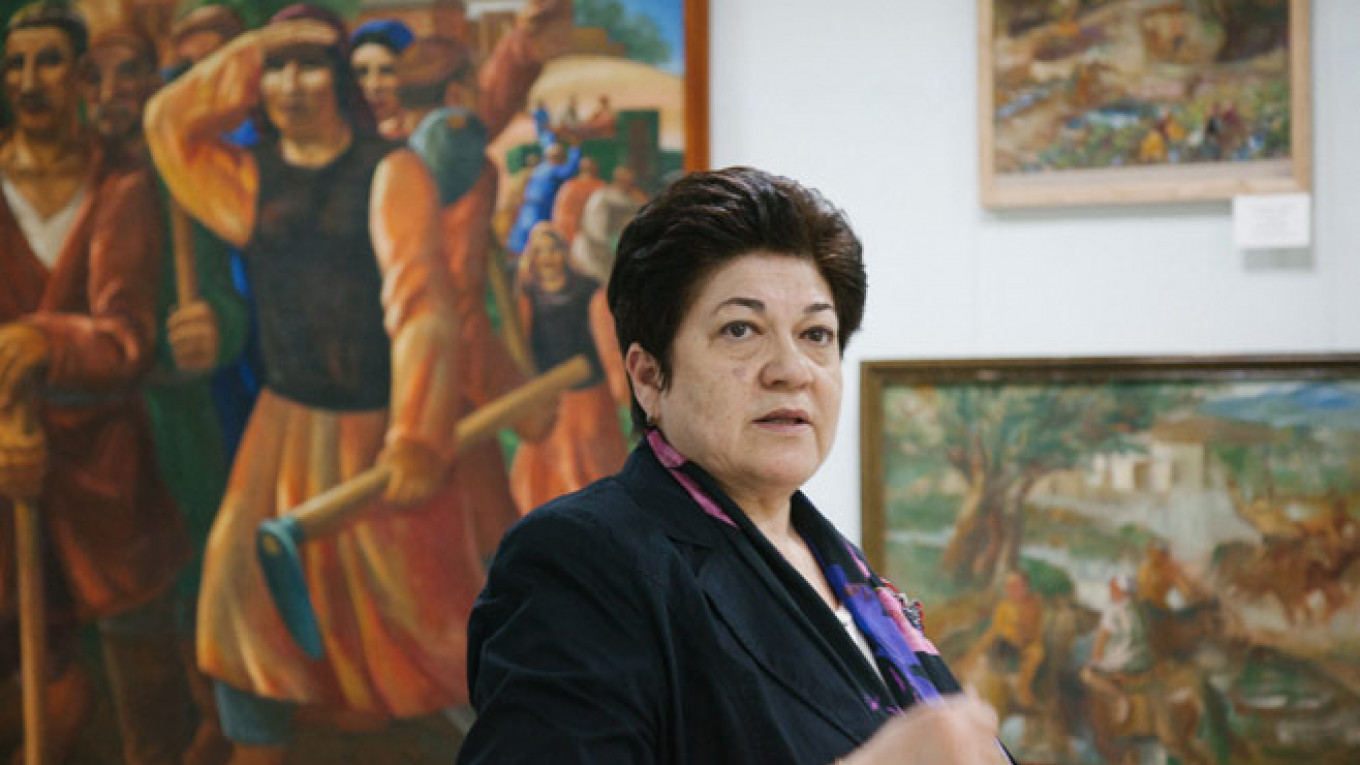Originally published by EurasiaNet.org.
It was supposed to be a day of festivities at a world-famous art museum out in the desert of western Uzbekistan. Instead, the stench of scandal sullied the occasion.
As dignitaries assembled in the region of Karakalpakstan on Sept. 4 to celebrate the centenary of Igor Savitsky, the founder of a museum housing a stunning collection of Russian avant-garde paintings, Uzbekistan’s art world is embroiled in a scandal featuring charges of forgery and embezzlement and suspicions of political machinations.
At the center of the controversy stands Marinika Babanazarova, the redoubtable hitherto director of the museum and the woman to whom Savitsky entrusted his life’s work when he died in 1984. By that time, the intrepid Soviet archeologist-turned-art-collector had amassed thousands of artworks that would otherwise have faced destruction, condemned by Soviet authorities as “decadent” and “bourgeois.” Savitsky hid the works far from Moscow’s prying eyes in Karakalpakstan, an arid autonomous region in western Uzbekistan, to preserve them for posterity.
Over the three decades since Savitsky’s death, Babanazarova has not only lovingly preserved his bequest, she has brought the Karakalpak State Art Museum to world prominence, casting reflected glory on Uzbekistan in the process.
But the 59-year-old former director now stands accused of plotting to forge paintings in the collection with the aim of selling off the originals for personal profit.
A report broadcast on Uzbekistan state TV news on Sept. 2 claimed that five paintings worth half a billion Uzbek som ($225,000) are missing from the museum and have been replaced with crude forgeries.
The report did not name Babanazarova, but it upped the ante in a war of words under way since late August, when she resigned. Babanazarova has since rescinded her resignation following public protests from her staff — an extraordinary show of support in a country where dissenters routinely end up behind bars.
Her departure also caused an outcry among art lovers abroad, prompting Uzbekistan’s Culture Ministry to step in to say that it “appreciates the former director’s contribution” but “urges the public to respect her decision to retire.”
By that time, Babanazarova had been summarily dismissed by the local authorities in Karakalpakstan.
Her resignation on Aug. 21 was made “under pressure and in a state of nervous stress,” she said in an open letter to Uzbekistan’s culture minister, Bahodir Ahmedov, posted on her Facebook page on August 29. The note prompted outpourings of support on social networks from local and foreign art lovers.
Pointing out that she would hardly damage an institution that has been her life’s work, she hinted at political machinations behind her troubles.
Babanazarova said she wrote to Uzbekistan’s Culture Ministry in Tashkent 12 times in recent weeks to seek support in the face of pressure from the Karakalpakstan local authorities, but that the minister had “thrown the museum to the wolves of small-time swindlers.”
Babanazarova did not name the “swindlers,” but appeared to imply that local officials wanted to get their hands on the valuable artworks.
Telephone calls to Uzbekistan’s Culture Ministry in Tashkent and the local Culture Ministry in Karakalpakstan went unanswered on Sept. 4.
As Babanazarova fights allegations of forgery and embezzlement in the Karakalpakstan museum, authorities claim to have uncovered art theft rings at other museums.
An official at the State Museum of Arts in Tashkent is under arrest on suspicion of selling off $18 million worth of paintings and replacing them with forgeries, Uzbek TV said on Sept. 2. A similar ring has been reported at a museum in the town of Angren.
The General Prosecutor’s Office repeatedly hung up on EurasiaNet.org’s calls for clarification on the investigations on Sept. 4.
Skeptics believe the revelations could be designed to shore up the accusations against Babanazarova, who could not be reached for comment by EurasiaNet.org.
Babanazarova said in a Facebook posting on Aug. 29 that she was “perfectly aware that the museum is not my property, but the heritage of the people and the country.”
There is also an ideological aspect to the case.
The museum’s collection of Russian avant-garde art and Soviet socialist realism is viewed by the international art world as a gem, but in Uzbekistan, the colonial overtones of such works are problematic.
The official ideology propagated by the administration of strongman leader Islam Karimov is critical of the colonial past and champions Uzbek values and traditions over all others — so much so that seemingly harmless cultural attributes such as Valentine’s Day and Santa Claus are derided as alien imports.
Moreover, rumors have swirled for years about behind-the-scenes turf wars over control of the valuable art collection held in Nukus, the dusty and depressed provincial capital of Karakalpakstan — a region best known for being the site of the environmental catastrophe of the dying Aral Sea.
Wagging tongues suggest that officials in Tashkent regard the international prestige enjoyed by the museum with envy and wish to have the 90,000-piece collection moved to the capital.
Originally published by EurasiaNet.org.
A Message from The Moscow Times:
Dear readers,
We are facing unprecedented challenges. Russia's Prosecutor General's Office has designated The Moscow Times as an "undesirable" organization, criminalizing our work and putting our staff at risk of prosecution. This follows our earlier unjust labeling as a "foreign agent."
These actions are direct attempts to silence independent journalism in Russia. The authorities claim our work "discredits the decisions of the Russian leadership." We see things differently: we strive to provide accurate, unbiased reporting on Russia.
We, the journalists of The Moscow Times, refuse to be silenced. But to continue our work, we need your help.
Your support, no matter how small, makes a world of difference. If you can, please support us monthly starting from just $2. It's quick to set up, and every contribution makes a significant impact.
By supporting The Moscow Times, you're defending open, independent journalism in the face of repression. Thank you for standing with us.
Remind me later.






